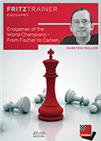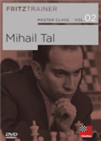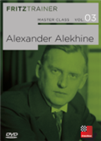Get ready for some calculation training!
Throughout the year I see a lot of exciting new chess books. My attention in the last year was captured by a series entitled Chess Calculation Training.
I was interested in this series, because one of my recurrent thoughts, both at the board and after finishing a game, was how I missed many of my opponent's moves because I didn't calculate well enough. Hence, I felt a need for futher study to focus on training this part of my game.
Then, after a series of incredible circumstances, I had the chance to interview the author, GM Romain Edouard, and wanted to share the insights I gleaned from one of the top player's mind with ChessBase readers.
Davide Nastasio: Could you tell our readers how the chess journey began for you?
 Romain Edouard: I began to play chess at the age of five, very randomly. My dad had tried to teach me and I didn't want to hear about it. Then he saw some advertisement for my home-town club, proposed me to join it, and I accepted.
Romain Edouard: I began to play chess at the age of five, very randomly. My dad had tried to teach me and I didn't want to hear about it. Then he saw some advertisement for my home-town club, proposed me to join it, and I accepted.
DN: Who coached you when you were young?
RE: My first coach was a lady, Madeleine Dinet, who was teaching kids to all kids in the club.
DN: Which book/s influenced you most in your formative years?
RE: None :) As most very young kids, I was just listening to my lessons and playing against my fellow friends.
DN: How did you become a grandmaster?
RE: I've been playing every tournament possible, and taking every piece of information possible. My family wasn't rich, so my Dad had to make sacrifices, and I had to work a lot by myself. Once I emerged as a player, I started to get several invitations, and things became easier.
This DVD emphasizes the importance of training your calculation skills. Dutch IM Robert Ris made a selection of training material which he uses in lessons with students ranging from 1400 to 2400.
Chess Calculation Training Volume 1: Middlegames
Let's pause to look at a little chess — some positions from his books. The next four positions come from the first of three volumes in his Chess Calculation Training series.
This book covers 10 different categories like punishing bad coordination, killer positional moves, attacking moves etc. — a total of 496 exercises, which will help a player to improve his or her own general thinking.
The first position comes from the game Sher vs Kamsky, Dos Hermanas, 2007.
The second position comes from the game Aronian vs Grischuk from the 2007 World Championship tournament in Mexico City. When searching for this game I discovered Aronian and Grischuk have played against each other more than 90 times!
Next, we have a position coming from one of Edouard's own games:
And lastly, a training position from this book:
Now let's return to the interview!
On this DVD GM Adrian Mikhalchishin presents games of the World Champions of the past to explain typical patterns and strategic concepts of these games and to show how grandmasters apply these ideas today.
DN: Keres and many other GMs do describe their chess life as a mixture of some pleasant experiences but also a lot of pain, especially when one loses important tournaments or games, what about you.
RE: Yes — chess is cool, but also very nasty. It's nearly the only sport where all your efforts can be spoiled in a second. When you play football, your opponent may score at minute 93 — but a blunder at chess can give you a feeling that you just came from 3-0 to 3-4 in a second. We must all live with it, and understand it sometimes goes the other way around — which isn't always easy!
DN: Is professional chess a good career option for the young today?
RE: I believe it becomes more and more difficult to get a great life with a regular job. In my opinion, trying to be amongst the best in any discipline/sport is a good life choice, although it involves some risks.
DN: Lately there has been a lot of talk of Chess960 as the future of chess, what is your opinion about it? Did you play it?
RE: I don't play it, as I have no opportunity to do so. I believe people who think real chess is coming to an end are in a bit of fantasy, but Chess960 is definitely an interesting idea, with indeed the advantage of limiting the opening impact.
DN: Can you play Blindfold games, and what is your opinion of blindfold play?
RE: I only played a few games, and once gave a blindfold simul against three players in Paris. But we all sort of play blindfold when we analyse games verbally, without a chessboard. And I think it's good for imagination and calculation skills.
DN: How far do you trust the computer evaluation of a position?
RE: I generally trust it, but there's a difference between what the engine thinks, and how easy a position is to handle for a human. And this is what makes chess interesting, otherwise, anyone with a strong computer and great memory would be a GM.
DN: If one side is attacking and the other side defending, who needs to calculate more? And why?
RE: I guess it depends on the position. Often, several moves are forced, and this can be for either side.
DN: Is it better to rely on one’s own intuition and judgment rather than calculate endlessly and get into time trouble?
RE: This depends on the time control! But I'm generally in favour of shortening them in order to give more importance to intuition. I believe perfection is boring.
Chess Calculation Training Volume 2: Endgames
 Let endgame expert Dr Karsten Müller show and explain the finesses of the world champions. Although they had different styles each and every one of them played the endgame exceptionally well, so take the opportunity to enjoy and learn from some of the best endgames in the history of chess.
Let endgame expert Dr Karsten Müller show and explain the finesses of the world champions. Although they had different styles each and every one of them played the endgame exceptionally well, so take the opportunity to enjoy and learn from some of the best endgames in the history of chess.
The second book of the Chess Calculation Training series is on the endgames. More specifically, this book is based on different categories which are important for learning the endgames like "technical wins", "find the draw", "evaluate the position" etc. for a total of 424 positions taken from tournament games, with instructive examples coming from different periods. The point is to raise the endgame familiarity of a player by giving a series of endgame positions which one will encounter in one's own tournament games.
Also, in this case, I'll present four positions taken from the book:
The first position comes from a game played in 1968!
Of course, we couldn't miss one of chess tactical geniuses: Tal, and how he wins with White!
 On this DVD Dorian Rogozenco, Mihail Marin, Oliver Reeh and Karsten Müller present the 8. World Chess Champion in video lessons: his openings, his understanding of chess strategy, his artful endgame play, and finally his immortal combinations.
On this DVD Dorian Rogozenco, Mihail Marin, Oliver Reeh and Karsten Müller present the 8. World Chess Champion in video lessons: his openings, his understanding of chess strategy, his artful endgame play, and finally his immortal combinations.
More famous names, White to play and win
A last position from this endgame book with another pair of players who have played more than 70 games against each other in their careers:
DN: What is your advice for a promising young player (2200-2300 Elo category)?
RE: I think it is important to play a lot, read, and follow everything that's happening in top tournaments. You shouldn't let new things slip past you, and nowadays you can learn a lot reading articles or listening to commentaries.
DN: Do you have any advice for senior players in the 2000 range?
RE: Well, I guess you can be a senior player and have high goals, in which case the advice is the same. If the goal is just to have fun, then just play openings you like, and follow top games and read articles/books just for enjoyment.
DN: Now I'd like to ask you some questions about your books because I know you are a prolific author. How did you select material for your own books?
RE: It's been a lot of work, but it's hard to say how many games I watched in order to collect my examples. Each of my "Chess Calculation Training" books has 400 to 500 examples, and I surely investigated at least 10 times more games for each of them. I didn't want to publish the same exercise books as everyone does — and sorting out the exercises into innovative categories was also hard work. I'm happy with the results, and I hope readers too.
DN: What are your present plans (playing and writing)?
RE: About playing, I just want to go to places I like, and play in important events, like with the French National Team, as long as I'm invited to play. I haven't been too happy with my play in the last few years but would like to get again close to 2700.
About writing, I will finish writing a book on my years working with Topalov. There, I'm telling many stories, investigating the most interesting games, and showing some of our opening ideas and explaining how we got to them. I've worked on this project for a very long time, and I'm happy I'm nearly done and ready to publish!
Chess Calculation Training Volume 3: Legendary Games

This book helps us to better know the champions we love through many positions coming from their games. There are a total of 480 exercises, and here once again, the material is divided into a number of categories: Attack, defence, Hidden moves, missed opportunities etc.
Four chapters are specifically dedicated to the games of Fischer, Karpov, Kasparov and Kramnik, but other chapters are full of familiar chess legends of yore.
Let's take a look:
The first position comes from a match Steinitz played against Reiner, in which Steinitz won three games and lost none.
Here Capablanca is Black, and this position is famous as a common tactical trap:
Also, this is a typical pattern to know, Black is Alekhine!
 On this DVD GMs Rogozenco, Marin, Müller, and IM Reeh present outstanding games, stunning combinations and exemplary endgames by Alekhine. And they invite you to improve your knowledge with the help of video lectures, annotated games and interactive tests
On this DVD GMs Rogozenco, Marin, Müller, and IM Reeh present outstanding games, stunning combinations and exemplary endgames by Alekhine. And they invite you to improve your knowledge with the help of video lectures, annotated games and interactive tests
Often we just see winning moves, but in the following position Black is losing, and in order to achieve a draw, must play a very interesting move:
DN: Could you tell me more about your job as Chief Editor at Thinkers Publishing?

RE: In 2015, just a year after Thinkers Publishing was created, I was offered the job of Editor-in-Chief. My job is to find authors, check their work, suggest improvements, and then correct/approve the material delivered by our typesetter(s). I'm very happy with the team we have built. Our biggest target is to constantly improve the quality of our books, without thinking too much about the quantity.
DN: What are the company plans for the future? For example: are you going to discover the Americas?
RE: The year 2019 will be a very interesting year for Thinkers Publishing, as we assigned quite a few big names of the chess world to write for us. I don't want to reveal a full list of names yet, but some will be (pleasant, I hope!) surprises for book readers. Talking about America, we're soon going to publish a book by Gata Kamsky!
I'd like to thank GM Edouard for this great interview, and Professor Nagesh Havanur for helping me in formulating great questions, of general interest to chess players.
For those interested in GM Edouard books, and many more fundamental chess books one should have in one's own library, here the link to Thinkers Publishing.


















 Romain Edouard: I began to play chess at the age of five, very randomly. My dad had tried to teach me and I didn't want to hear about it. Then he saw some advertisement for my home-town club, proposed me to join it, and I accepted.
Romain Edouard: I began to play chess at the age of five, very randomly. My dad had tried to teach me and I didn't want to hear about it. Then he saw some advertisement for my home-town club, proposed me to join it, and I accepted.




